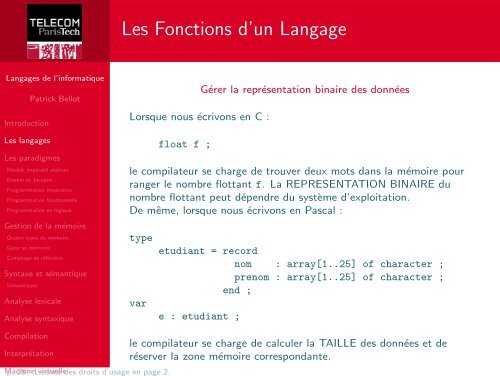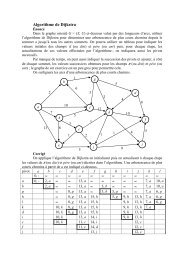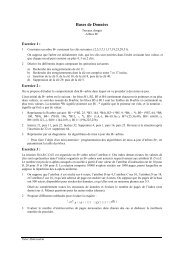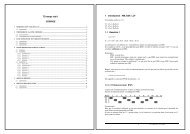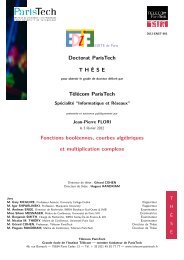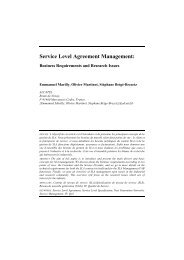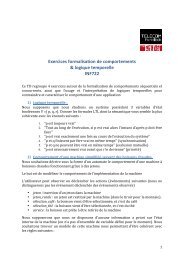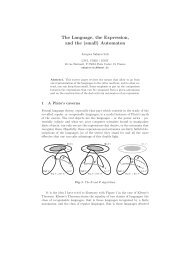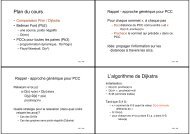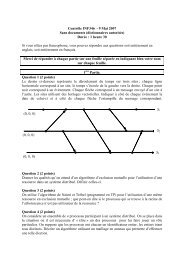- Page 1 and 2: Machine p. 1 - Licence virtuelle de
- Page 3 and 4: Machine p. 3 - Licence virtuelle de
- Page 5 and 6: Les Ordinateurs Langages de l’inf
- Page 7 and 8: Machine p. 7 - Licence virtuelle de
- Page 9 and 10: Machine p. 9 - Licence virtuelle de
- Page 11 and 12: Machine p. 11 - Licence virtuellede
- Page 13 and 14: Plan Langages de l’informatique P
- Page 15 and 16: Machine p. 15 - Licence virtuellede
- Page 17: Les Fonctions d’un Langage Langag
- Page 21 and 22: Machine p. 21 - Licence virtuellede
- Page 23 and 24: Plan Langages de l’informatique P
- Page 25 and 26: Les paradigmes Langages de l’info
- Page 27 and 28: Plan Langages de l’informatique P
- Page 29 and 30: Le Modèle Impératif Abstrait Lang
- Page 31 and 32: Machine p. 31 - Licence virtuellede
- Page 33 and 34: Machine p. 33 - Licence virtuellede
- Page 35 and 36: Machine p. 35 - Licence virtuellede
- Page 37 and 38: Machine p. 37 - Licence virtuellede
- Page 39 and 40: Machine p. 39 - Licence virtuellede
- Page 41 and 42: Machine p. 41 - Licence virtuellede
- Page 43 and 44: Machine p. 43 - Licence virtuellede
- Page 45 and 46: Machine p. 45 - Licence virtuellede
- Page 47 and 48: Machine p. 47 - Licence virtuellede
- Page 49 and 50: Machine p. 49 - Licence virtuellede
- Page 51 and 52: Machine p. 51 - Licence virtuellede
- Page 53 and 54: Plan Langages de l’informatique P
- Page 55 and 56: Le Paradigme Fonctionnel Langages d
- Page 57 and 58: Le Paradigme Fonctionnel Langages d
- Page 59 and 60: Machine p. 59 - Licence virtuellede
- Page 61 and 62: Machine p. 61 - Licence virtuellede
- Page 63 and 64: Machine p. 63 - Licence virtuellede
- Page 65 and 66: Machine p. 65 - Licence virtuellede
- Page 67 and 68: Plan Langages de l’informatique P
- Page 69 and 70:
Machine p. 69 - Licence virtuellede
- Page 71 and 72:
Machine p. 71 - Licence virtuellede
- Page 73 and 74:
Machine p. 73 - Licence virtuellede
- Page 75 and 76:
Machine p. 75 - Licence virtuellede
- Page 77 and 78:
Machine p. 77 - Licence virtuellede
- Page 79 and 80:
Machine p. 79 - Licence virtuellede
- Page 81 and 82:
Le coloriage de carte Langages de l
- Page 83 and 84:
Plan Langages de l’informatique P
- Page 85 and 86:
Plan Langages de l’informatique P
- Page 87 and 88:
Machine p. 87 - Licence virtuellede
- Page 89 and 90:
La mémoire automatique ou“pile
- Page 91 and 92:
Machine p. 91 - Licence virtuellede
- Page 93 and 94:
Plan Langages de l’informatique P
- Page 95 and 96:
L’exemple de la calculatrice Lang
- Page 97 and 98:
Machine p. 97 - Licence virtuellede
- Page 99 and 100:
Machine p. 99 - Licence virtuellede
- Page 101 and 102:
Machine p. 101 - virtuelle Licence
- Page 103 and 104:
Plan Langages de l’informatique P
- Page 105 and 106:
Machine p. 105 - virtuelle Licence
- Page 107 and 108:
Machine p. 107 - virtuelle Licence
- Page 109 and 110:
Machine p. 109 - virtuelle Licence
- Page 111 and 112:
Machine p. 111 - virtuelle Licence
- Page 113 and 114:
Machine p. 113 - virtuelle Licence
- Page 115 and 116:
Machine p. 115 - virtuelle Licence
- Page 117 and 118:
Machine p. 117 - virtuelle Licence
- Page 119 and 120:
Machine p. 119 - virtuelle Licence
- Page 121 and 122:
Machine p. 121 - virtuelle Licence
- Page 123 and 124:
Machine p. 123 - virtuelle Licence
- Page 125 and 126:
Machine p. 125 - virtuelle Licence
- Page 127 and 128:
Plan Langages de l’informatique P
- Page 129 and 130:
Machine p. 129 - virtuelle Licence
- Page 131 and 132:
Flex/lex Langages de l’informatiq
- Page 133 and 134:
Plan Langages de l’informatique P
- Page 135 and 136:
Machine p. 135 - virtuelle Licence
- Page 137 and 138:
Machine p. 137 - virtuelle Licence
- Page 139 and 140:
Machine p. 139 - virtuelle Licence
- Page 141 and 142:
Machine p. 141 - virtuelle Licence
- Page 143 and 144:
Machine p. 143 - virtuelle Licence
- Page 145 and 146:
Le compilateur : Frontent et Backen
- Page 147 and 148:
Le compilateur : Frontent et Backen
- Page 149 and 150:
Exemple de génération Langages de
- Page 151 and 152:
Le compilateur : Frontent et Backen
- Page 153 and 154:
Machine p. 153 - virtuelle Licence
- Page 155 and 156:
Machine p. 155 - virtuelle Licence
- Page 157 and 158:
Plan Langages de l’informatique P
- Page 159 and 160:
Machine p. 159 - virtuelle Licence
- Page 161 and 162:
Machine p. 161 - virtuelle Licence
- Page 163 and 164:
Plan Langages de l’informatique P
- Page 165 and 166:
Machine p. 165 - virtuelle Licence
- Page 167 and 168:
Machine p. 167 - virtuelle Licence
- Page 169 and 170:
Machine p. 169 - virtuelle Licence
- Page 171 and 172:
Machine p. 171 - virtuelle Licence
- Page 173 and 174:
Machine p. 173 - virtuelle Licence
- Page 175 and 176:
La spécification Langages de l’i
- Page 177 and 178:
Machine p. 177 - virtuelle Licence
- Page 179 and 180:
Machine p. 179 - virtuelle Licence
- Page 181 and 182:
Machine p. 181 - virtuelle Licence
- Page 183 and 184:
Machine p. 183 - virtuelle Licence
- Page 185 and 186:
Machine p. 185 - virtuelle Licence
- Page 187 and 188:
Machine p. 187 - virtuelle Licence
- Page 189 and 190:
Machine p. 189 - virtuelle Licence
- Page 191 and 192:
Machine p. 191 - virtuelle Licence
- Page 193 and 194:
Machine p. 193 - virtuelle Licence
- Page 195 and 196:
Machine p. 195 - virtuelle Licence
- Page 197 and 198:
Machine p. 197 - virtuelle Licence
- Page 199 and 200:
Machine p. 199 - virtuelle Licence


